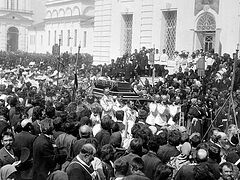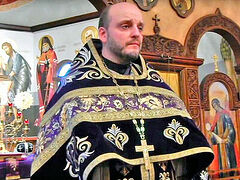In the name of the Father, and of the Son, and of the Holy Spirit!
Each one of us takes pains to learn the Law of God. Especially people who are just joining the Church and young people who are studying. Their minds are capable of learning, and they strive to learn as much as possible from the Law of God, from services, from the dogmas of the Church and from its history. And, having become imbued with knowledge, we begin to teach our neighbors and others—and this is natural. But we often notice that it does not bear any good results; the seemingly correct and beautiful words we say do not resonate in the hearts of our neighbors. These are words from the Law of God. Why does this happen? Because we often forget while studying the Law of God and accumulating this knowledge—which, undoubtedly, we need—that first of all, If we live in the Spirit, let us also walk in the Spirit. Today the Apostle Paul tells us about this (Gal. 5:25).
The memory of the saint whom we are commemorating today in this church, St. Seraphim of Sarov, in this sense effectively awakens and sobers us. This man, who struggled in the wilderness and crucified the flesh with the affections and lusts (Gal. 5:24), acquired the spirit of peace, acquired the Holy Spirit, and as the Church sings: “becoming for many the way to salvation.”
He did not graduate from any theological academies or institutes. Of course, this is not to offend the people who went to theological institutes or to stop them in this path. But the most important thing is that they all should bear in mind that acquiring the Holy Spirit by crucifying the flesh with the affections and lusts, humility, mercy and a peaceful spirit—these are the things without which all our knowledge will be as sounding brass, or a tinkling cymbal, as the Apostle Paul says (1 Cor. 13:1). We will utter meaningless sounds, and the spirit of our words will be lifeless. Today the Apostle Paul tells us such important words that we simply must not miss any of them. I suggest we all print these words out in large type, cut them out, hang them on the wall and turn to them every day.
The Apostle Paul writes that the fruit of the Spirit is love, joy, peace, longsuffering, gentleness, goodness, faith, meekness, temperance (Gal. 5:22-23). By these words we must test and evaluate our inner state as to whether we have the spirit of love, peace, long-suffering, goodness and temperance, as it was with St. Seraphim of Sarov; or on the contrary, we are vain, annoy and envy each other. The spiritual labor performed by St. Seraphim of Sarov was seemingly so simple yet so difficult and incomprehensible for our contemporaries. For a long time he did not seek Christ amongst other people, amongst learned or famous men, but he sought Him in the forest, in prayers, temptations and suffering. And there in the wilderness this vain world found him as well. We remember how a band of robbers came to him in search of money and valuables, beating him mercilessly and even fracturing his spine, but he was so humble that he did not even want to condemn the robbers who had virtually mutilated him, and he wished the no ill.
We have a wonderful example. An example of a truly humble man who is simple and at the same time wise—wiser than many theologians, philosophers and experts in this world. Multitudes of people would flock to St. Seraphim, just as they come to the church to priests. They all brought their pain, their hardships, and their suffering, and he never turned anyone away. He shared with all those who came to him the love that he had acquired in his spiritual labors.
Bear ye one another's burdens, and so fulfil the law of Christ (Gal. 6, 2). These words were not just “instruction” for him, but the motto of his whole life.
The love that St. Seraphim gives to each of us today is the spirit of peace. May the blessing of the Holy Spirit be with us all.
Amen.




